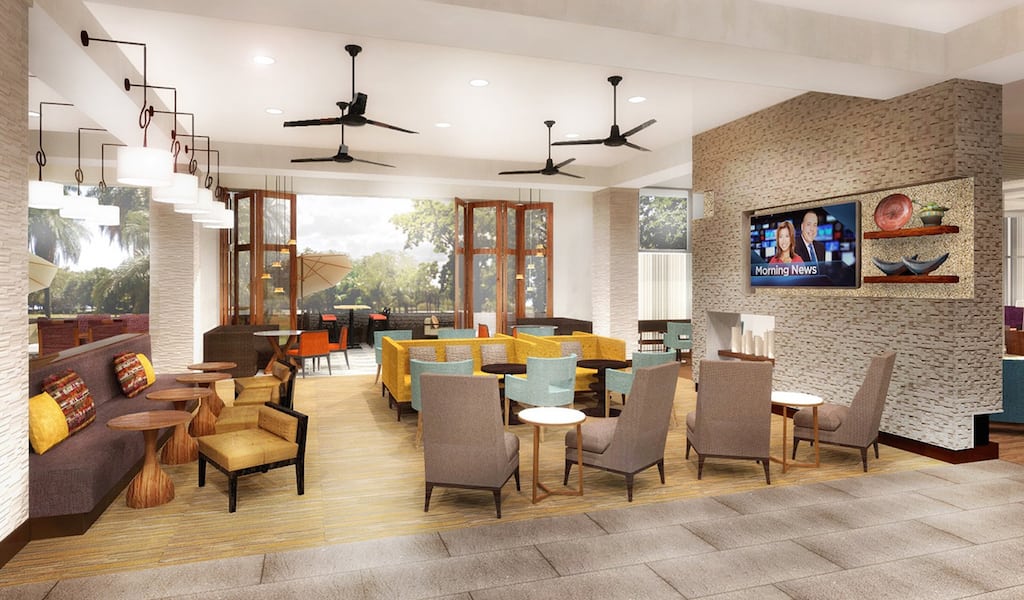Homewood Suites Moves Into Latin America With New Prototype

Skift Take
The Homewood Suites by Hilton extended stay brand is making a push into Latin America, where this type of select service hotel model is vastly under represented, with a new prototype hotel product customized for the individual destinations from Santo Domingo to Sao Paulo.
Lessons learned during this international expansion will also help inform future plans to move into Europe as well.
Homewood Suites is scheduled to open as many as 30 new hotels in the next four to five years beginning as soon as 2016. The first new management contract was officially announced earlier this month for the Homewood Suites by Hilton Santo Domingo in the capital of the Dominican Republic. Opening in late 2017, the 120-room property will be the first Homewood Suites in the Caribbean.
For the Latin American hotels, Bill Duncan, global head of brand management at Homewood Suites, says Hilton is "tropicalizing" the specific aesthetics and offering more room variations to align with each country where the hotels will operate. This is a dramatic shift for Homewood Suites, he explains, because in the past the company has always attempted to standardize the guest experience and architecture/design as much as possible at its 360+ existing locations across North America.
Traditionally, South American developers have shied away from the extended stay segment because the properties have larger rooms with full kitchens and lower room counts per building volume. From a traditional business perspective for most Latin American owners, less rooms means less revenue.
"South America tends to parallel pretty much Europe in that hotels have less space because of where hotels are usually developed, and space is at a premium in those densely populated areas," says Duncan. "So the challenge for us is, how do we take all of the things we do with Homewood Suites in the U.S. and Canada within the context of space utilization, and scale them to take advantage of the development opportunities in the Latin American/Caribbean market? And then if we can figure that out, that is a step in the right direction for the potential to expand overseas into Europe at some point."
The new Homewood Suites prototype, first introduced in North America last year, incorporates a larger percentage of the smaller Studio Suites rooms and includes higher end finishings and more contemporary design elements. Homewood's Studio Suites typically start around 420 square feet and sleep up to four people in North America, which is about 20% larger than standard hotel guest rooms.
With the new prototype, the studios make up about 85% of the room inventory, with the rest split between one- and two-bedrooms. Market dynamics are driving this in North America as well. Duncan says there's a shift in consumer demand for more studios and less one-bedrooms because more people now want open floor plans. That makes rooms feel bigger and it's aligned with home design trends.
That shift in demand for more Studio Suites also helps make the extended stay model more attractive to Latin American builders.
Presently in Mexico and South America especially, corporate apartments are primarily filling the demand now for long term rentals, but American business travelers and Hilton HHonors members want access to their preferred brands. Duncan says Hilton anticipates North American travelers will make up about 40% of room nights collectively in the region, and that "extended stay" refers to anything over five consecutive nights.
In an effort to convince more local owners and developers to build Homewood Suites product, Hilton has developed a comprehensive new sales and marketing platform to show the business ROI for the extended stay model.
"We're updating presentations, creating new development training, we're shooting a video with development education about what extended stay is, and we're creating other new tools," explains Duncan. "Because once you build that story right, you can explain how they can better cover shoulder nights, cover slower seasons, boost profitability. Extended stay takes less labor and has less wear and tear because customers don't need as many services and they don't check-in and check-out as much, etc., etc. So you build up all these touchpoints and then a lightbulb goes off and they say, 'Hey, this could be good.'"
The business climate in many Latin American countries is helping too. The economies in destinations like Mexico, Colombia, Chile and Brazil are growing, and Hilton's development team is emphasizing the complete lack of U.S.-flagged extended stay hotels in their first tier cities and resort areas.
"We've talked to a lot of experts, and there is not a lot of data or any tracking anywhere in Latin America that we can currently see," says Duncan. "The extended stay traveler is all being handled by corporate apartments and other hotels, which are very few and far between, so the opportunity is pretty wide open in our book."
The first permanent show rooms for developers to see will be ready in Miami in a few weeks at Homewood Suites' Latin American HQ in Miami. Hilton chose to locate its regional office and showroom in Miami versus South America or Mexico, because there's a growing contingent of U.S. developers looking to expand beyond North America's borders. Homewood Suites is well represented in South Florida and Orlando due to the wealth of family travel from Latin American source markets, so there's a large group of builders familiar with the product.
Greg Oates covers hospitality and tourism development. Email: go@skift.com.




